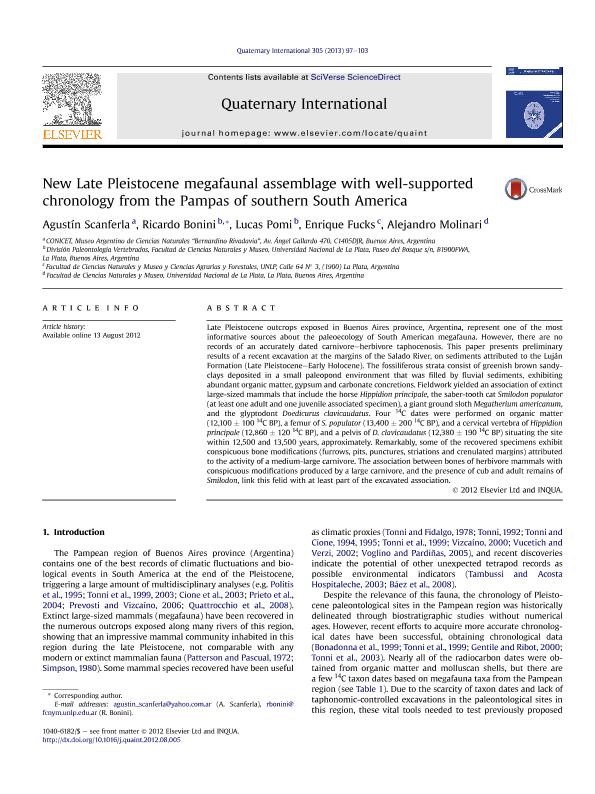Mostrar el registro sencillo del ítem
dc.contributor.author
Scanferla, Carlos Agustín

dc.contributor.author
Bonini, Ricardo Adolfo

dc.contributor.author
Pomi, Lucas Horacio

dc.contributor.author
Fucks, Enrique Eduardo
dc.contributor.author
Molinari, Alejandro Martín

dc.date.available
2016-02-19T20:38:37Z
dc.date.issued
2013-08-13
dc.identifier.citation
Scanferla, Carlos Agustín; Bonini, Ricardo Adolfo; Pomi, Lucas Horacio; Fucks, Enrique Eduardo; Molinari, Alejandro Martín; New Late Pleistocene megafaunal assemblage with well-supported chronology from the Pampas of southern South America; Elsevier; Quaternary International; 305; 13-8-2013; 97-103
dc.identifier.issn
1040-6182
dc.identifier.uri
http://hdl.handle.net/11336/4334
dc.description.abstract
Late Pleistocene outcrops exposed in Buenos Aires province, Argentina, represent one of the most informative sources about the paleoecology of South American megafauna. However, there are no records of an accurately dated carnivoreeherbivore taphocenosis. This paper presents preliminary results of a recent excavation at the margins of the Salado River, on sediments attributed to the Luján Formation (Late Pleistocene-Early Holocene). The fossiliferous strata consist of greenish brown sandyclays deposited in a small paleopond environment that was filled by fluvial sediments, exhibiting abundant organic matter, gypsum and carbonate concretions. Fieldwork yielded an association of extinct large-sized mammals that include the horse Hippidion principale, the saber-tooth cat Smilodon populator (at least one adult and one juvenile associated specimen), a giant ground sloth Megatherium americanum, and the glyptodont Doedicurus clavicaudatus. Four 14C dates were performed on organic matter (12,100 100 14C BP), a femur of S. populator (13,400 200 14C BP), and a cervical vertebra of Hippidion principale (12,860 120 14C BP), and a pelvis of D. clavicaudatus (12,380 190 14C BP) situating the site within 12,500 and 13,500 years, approximately. Remarkably, some of the recovered specimens exhibit conspicuous bone modifications (furrows, pits, punctures, striations and crenulated margins) attributed to the activity of a medium-large carnivore. The association between bones of herbivore mammals with conspicuous modifications produced by a large carnivore, and the presence of cub and adult remains of Smilodon, link this felid with at least part of the excavated association.
dc.format
application/pdf
dc.language.iso
eng
dc.publisher
Elsevier

dc.rights
info:eu-repo/semantics/openAccess
dc.rights.uri
https://creativecommons.org/licenses/by-nc-nd/2.5/ar/
dc.subject
Pleistocene
dc.subject
Argentina
dc.subject
Megafauna
dc.subject
14c
dc.subject.classification
Paleontología

dc.subject.classification
Ciencias de la Tierra y relacionadas con el Medio Ambiente

dc.subject.classification
CIENCIAS NATURALES Y EXACTAS

dc.title
New Late Pleistocene megafaunal assemblage with well-supported chronology from the Pampas of southern South America
dc.type
info:eu-repo/semantics/article
dc.type
info:ar-repo/semantics/artículo
dc.type
info:eu-repo/semantics/publishedVersion
dc.date.updated
2016-03-30 10:35:44.97925-03
dc.journal.volume
305
dc.journal.pagination
97-103
dc.journal.pais
Países Bajos

dc.journal.ciudad
Amsterdam
dc.description.fil
Fil: Scanferla, Carlos Agustín. Consejo Nacional de Investigaciones Científicas y Técnicas. Oficina de Coordinación Administrativa Parque Centenario. Museo Argentino de Ciencias Naturales; Argentina
dc.description.fil
Fil: Bonini, Ricardo Adolfo. Universidad Nacional de la Plata. Facultad de Ciencias Naturales y Museo. División Paleontología Vertebrados; Argentina
dc.description.fil
Fil: Pomi, Lucas Horacio. Universidad Nacional de la Plata. Facultad de Ciencias Naturales y Museo. División Paleontología Vertebrados; Argentina
dc.description.fil
Fil: Fucks, Enrique Eduardo. Universidad Nacional de la Plata. Facultad de Ciencias Naturales y Museo; Argentina
dc.description.fil
Fil: Molinari, Alejandro Martín. Universidad Nacional de la Plata. Facultad de Ciencias Naturales y Museo; Argentina
dc.journal.title
Quaternary International

dc.relation.alternativeid
info:eu-repo/semantics/altIdentifier/doi/http://dx.doi.org/10.1016/j.quaint.2012.08.005
dc.relation.alternativeid
info:eu-repo/semantics/altIdentifier/issn/1040-6182
dc.relation.alternativeid
info:eu-repo/semantics/altIdentifier/url/http://www.sciencedirect.com/science/article/pii/S1040618212010452
Archivos asociados
